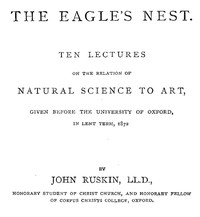The Eagle's Nest by John Ruskin
"The Eagle's Nest" by John Ruskin is a collection of lectures on the intersection of natural science and art, delivered in the early 19th century. This work, which consists of ten lectures, discusses the importance of wisdom in both fields, arguing that understanding and emotion are vital to true mastery in art, rather than technical skills alone. Ruskin brings forth concepts such as the virtues of art and science, and he challenges
the audience to reflect on how these domains influence human experience and perception. At the start of the work, Ruskin establishes the tone and intent of his lectures, emphasizing the importance of clarity and accessibility in his teaching. He opens by reflecting on how art and science should ideally work together to elevate human understanding and appreciation of beauty. He introduces the concept of "sophia," or wisdom, as a guiding principle that must govern both artistic creation and scientific inquiry. Through various examples, he encourages his audience to pursue knowledge that is unselfish and enriching, setting the stage for his exploration of deeper philosophical ideas throughout the lectures. (This is an automatically generated summary.)
Read now or download (free!)
| Choose how to read this book | Url | Size | ||||
|---|---|---|---|---|---|---|
| Read online (web) | https://sendtokindle.compellingsciencefiction.com/ebooks/42917.html.images | 498 kB | ||||
| EPUB3 (E-readers incl. Send-to-Kindle) | https://sendtokindle.compellingsciencefiction.com/ebooks/42917.epub3.images | 218 kB |
Send
to kindle email: |
|||
| EPUB (no images, older E-readers) | https://sendtokindle.compellingsciencefiction.com/ebooks/42917.epub.noimages | 222 kB | ||||
| Kindle | https://sendtokindle.compellingsciencefiction.com/ebooks/42917.kf8.images | 383 kB | ||||
| older Kindles | https://sendtokindle.compellingsciencefiction.com/ebooks/42917.kindle.images | 343 kB | ||||
| Plain Text UTF-8 | https://sendtokindle.compellingsciencefiction.com/ebooks/42917.txt.utf-8 | 376 kB | ||||
| Download HTML (zip) | https://www.gutenberg.org/cache/epub/42917/pg42917-h.zip | 202 kB | ||||
| There may be more files related to this item. | ||||||
Similar Books
About this eBook
| Author | Ruskin, John, 1819-1900 |
|---|---|
| Title |
The Eagle's Nest
Ten Lectures on the Relation of Natural Science to Art, Given Before the University of Oxford, in Lent Term, 1872 |
| Note | Reading ease score: 66.7 (8th & 9th grade). Neither easy nor difficult to read. |
| Credits | E-text prepared by Paul Murray, KD Weeks, and the Online Distributed Proofreading Team |
| Language | English |
| LoC Class | N: Fine Arts |
| Subject | Art and science |
| Category | Text |
| EBook-No. | 42917 |
| Release Date | Jun 11, 2013 |
| Most Recently Updated | Jun 15, 2020 |
| Copyright Status | Public domain in the USA. |
| Downloads | 150 downloads in the last 30 days. |
| Project Gutenberg eBooks are always free! | |

